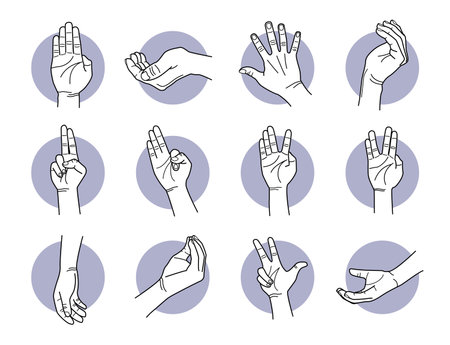Introduction: Intertwining Palmistry and British Vernacular
When exploring the vibrant tapestry of British culture, one cannot ignore the colourful language that peppers daily conversation. From cheeky idioms to quirky slang, the British way with words is both charming and layered with meaning. But what if we could deepen our understanding of this linguistic world by viewing it through a different lens—one rooted in tradition and mystique? Enter palmistry, the ancient art of reading the lines and shapes on ones hand to gain insight into personality and fate. At first glance, palmistry and British vernacular might seem worlds apart. Yet, both share a fascination with lines, fate, and the stories hidden beneath the surface. This article embarks on an exploration of how examining the creases and folds of our palms can mirror the nuanced language Brits use to interpret life’s unpredictability. By drawing connections between the symbolic language of palmistry and the everyday expressions found across the UK, we set the stage for a unique journey—one where hands and words together reveal the spirit of British communication.
2. Reading Between the Lines: Idioms & the Language of Destiny
British English is renowned for its vivid idiomatic expressions, many of which revolve around themes of fate, fortune, and predicting the future—much like the practice of palmistry. Both palm reading and British idioms often hint at life’s unpredictability and our attempts to decipher what lies ahead. By exploring these phrases, we uncover a fascinating parallel between the language of destiny in idioms and the symbolic lines etched on our palms.
Idiomatic Expressions Rooted in Fate and Luck
Let’s examine some quintessentially British idioms that echo concepts central to palmistry:
| Idiom/Slang | Meaning | Palmistry Parallel |
|---|---|---|
| Written in the stars | Destined or fated to happen; inevitable outcome | The belief that one’s fate is preordained, much like interpreting life lines on a palm |
| Luck of the draw | Outcome determined by chance rather than choice | Reflects the randomness attributed to certain palm markings or hand shapes |
| Cross my palm with silver | A request for payment before telling someone’s fortune | A direct reference to palmistry tradition, highlighting the transactional nature of fortune-telling |
| Your fate is sealed | Your future is decided and unchangeable | Echoes the idea that certain lines on the palm reveal unalterable outcomes |
| Toss up | An unpredictable situation; could go either way | Similar to ambiguous or unclear palm lines that defy straightforward interpretation |
The Predictive Aspect: Language Meets Palmistry
Just as a palmist reads between the lines of your hand to glimpse your destiny, British speakers use these idioms to express resignation or hope regarding what might come. Saying something is “written in the stars” or “luck of the draw” acknowledges forces beyond one’s control—mirroring the mystical aura surrounding hand reading.
Cultural Resonance in Everyday Speech
What’s especially British about these phrases is their subtle blend of wit, scepticism, and acceptance of life’s twists. In conversations from local pubs to London offices, such expressions help people discuss uncertainty and fortune with humour and a sense of shared understanding.

3. Hands, Fingers, and British Slang
British culture is rich with idioms and slang expressions that feature hands and fingers, serving as both linguistic flourishes and reflections of deeper meanings. By examining these phrases through the lens of palmistry, we can uncover fascinating parallels between language, gesture, and character analysis.
Common British Idioms Involving Hands and Fingers
Consider the phrase give someone a hand. In everyday British English, this means to assist or help someone. Its roots lie in the direct physical act of offering one’s hand—an open gesture that signifies support. In palmistry, an open palm is often interpreted as a sign of generosity and openness to others. The idiom thus mirrors both literal action and its symbolic reading in hand analysis.
On the other end of the spectrum is not lift a finger. This saying describes someone unwilling to make even the smallest effort to help. The imagery here is subtle yet pointed; in palmistry, inactive or rigid fingers may suggest reluctance or resistance to change, aligning neatly with the idiom’s connotation of laziness or indifference.
Another quintessentially British saying is all fingers and thumbs. Used to describe someone who is clumsy or awkward with their hands, this expression conjures images of fumbling gestures. Palmists associate such lack of dexterity with certain personality traits—perhaps nervousness or lack of confidence—further linking the idiom to interpretations found in hand reading.
Gestures, Palmistry, and Everyday Speech
The way these idioms harness hand-related imagery demonstrates how gestures are embedded in both communication and character assessment. In British culture, using such language not only conveys meaning but also subtly references behavioural cues that palmists study closely: from the assertive handshake to the nervous wringing of fingers. Thus, everyday speech and palmistry intersect, each enriching our understanding of human nature through the symbolism of hands and fingers.
4. Fortune Telling and British Humour
British culture is famed for its sharp wit, understated humour, and the ability to find levity even in the most serious subjects—including fortune telling and palmistry. This cultural attitude extends into language, where idioms and slang infused with cheekiness reflect both scepticism and affection towards the mystical arts. Let’s delve into how British humour cleverly intertwines with palmistry and everyday speech, using expressions that embody this blend.
Palmistry Meets Playful Language
The British tendency to poke fun at grandiose claims or superstitions can be seen in idioms that reference palmistry, often used tongue-in-cheek or with a wry smile. For example, the phrase ‘palm off’ refers to handing something (often unwanted) onto someone else under false pretences—a playful nod to sleight of hand, as if tricking someone through clever misdirection, much like a dubious fortune teller might.
Common Expressions: Origins and Usage
| Expression | Literal Meaning | Cultural Context / Typical Usage |
|---|---|---|
| Palm off | To get rid of something by deceiving someone | Implying crafty manoeuvring, akin to a charlatan fortune-teller; e.g., “He tried to palm off his chores on me.” |
| Read the riot act | Give a stern warning or reprimand | Originally from a legal context but now used light-heartedly; evokes the seriousness of reading one’s fate in their palm with a dramatic flourish; e.g., “She read me the riot act after I missed curfew.” |
| Cheeky devil | A mischievous or impudent person | Used affectionately or mock-scoldingly; captures the playful irreverence common in British banter—could describe a fortune teller who makes bold predictions for a laugh. |
| Spin a yarn | Tell a tall tale or elaborate story | References storytellers (including some palmists!) who embellish for effect; e.g., “He spun me a yarn about my past life.” |
The Role of Wit in Everyday Conversation
Banter is an essential aspect of British social interaction, and expressions borrowed from palmistry provide perfect material for witty exchanges. Using phrases like ‘palm off’ or ‘read the riot act’ allows speakers to inject humour and mild sarcasm into ordinary situations—whether talking about dodging responsibilities or exaggerating the drama of a conversation. These idioms are not just linguistic quirks; they reveal a cultural comfort with irony and self-deprecation, which underpin both British humour and attitudes toward fate and fortune.
Cultural Relevance: Why It Matters
The enduring popularity of these expressions demonstrates how deeply embedded palmistry—and the gentle mocking of it—remains in British vernacular. They serve as reminders that language is not only a means of communication but also a tool for bonding over shared cultural touchstones. In Britain, learning such idioms is more than acquiring vocabulary; it’s an invitation to join in on the national joke about destiny, luck, and our attempts to predict what comes next.
5. Palmistry as a Conversation Starter: Social Etiquette and Small Talk
In the realm of British culture, small talk is an art form in itself—a subtle dance of wit, politeness, and unspoken rules. Both palmistry and British slang serve as unconventional, yet effective vehicles for breaking the ice. When you offer to read someone’s palm at a pub or during a gathering, it instantly piques curiosity and invites light-hearted banter. This mirrors the way British idioms and slang are sprinkled into conversations to foster camaraderie or lighten the mood.
Consider the typical British setting: perhaps a garden party in Surrey or after-work drinks in a bustling London bar. Here, formal introductions can feel stiff; however, sliding into a chat with “Fancy letting me have a butcher’s at your hand?”—a playful use of Cockney rhyming slang (“butcher’s hook” means “look”)—immediately shifts the dynamic. People respond to novelty, and palmistry offers just that. It gives participants a reason to laugh about their “life line,” joke about being “all fingers and thumbs,” or tease someone who’s been called “handy” in more ways than one.
The magic lies in how both palm reading and slang sidestep directness—a hallmark of British etiquette. Instead of launching into personal questions, you’re gently exploring personality traits or futures via the lines on a hand, all wrapped up in humour and idiomatic expressions. In settings ranging from family gatherings to workplace socials, these traditions can transform awkward silences into lively exchanges. Palmistry invites storytelling; slang adds local colour and relatability.
Ultimately, mastering this blend of cultural language and quirky tradition not only enhances your grasp of British English but also opens doors to authentic social connections—proving that sometimes, it’s what’s said between the lines (or on the palm) that truly matters.
6. Key Expressions and their Palmistry Parallels: A Mini-Glossary
Diving into the heart of cultural crossover, this mini-glossary matches select British idioms and slang with their palmistry counterparts. Each pairing highlights how language and hand symbolism can reflect similar meanings, offering a unique route to understanding both British culture and the art of palm reading.
1. “To have someone wrapped around your little finger”
Palmistry Parallel: The Little Finger (Mercury Finger)
In British slang, if you have someone “wrapped around your little finger,” you have significant influence over them. In palmistry, the little finger relates to communication and persuasion. A long, flexible Mercury finger denotes charm and the ability to sway others—mirroring the idiom’s implication of subtle control.
2. “Bite the bullet”
Palmistry Parallel: The Mars Mount
This idiom means to face a difficult situation bravely. In palmistry, the mount of Mars symbolises courage and resilience. A well-developed Mars mount suggests someone who is undaunted by adversity, just as one who bites the bullet refuses to shy away from challenges.
3. “Keep your cards close to your chest”
Palmistry Parallel: Heart Line
To “keep your cards close to your chest” is to be secretive or cautious about revealing information. The heart line in palmistry represents emotional expression. A deep, clear heart line ending beneath the middle finger suggests someone who is reserved—echoing the idiom’s connotation of guardedness.
4. “Lose your grip”
Palmistry Parallel: Thumb Flexibility
If someone has “lost their grip” in British slang, they’ve lost control or composure. In palmistry, thumb flexibility signifies adaptability or rigidity. A rigid thumb may indicate stubbornness and a lack of control under stress—paralleling the idiom’s suggestion of slipping beyond ones grasp.
5. “Throw in the towel”
Palmistry Parallel: Life Line Breaks
When someone “throws in the towel,” they give up or surrender. In palmistry, breaks or interruptions on the life line can point to periods of giving up or significant change—capturing the spirit of this idiom’s association with quitting or conceding defeat.
Bridging Language and Symbolism
By aligning these everyday expressions with key concepts in palmistry, learners not only deepen their understanding of British idioms and slang but also appreciate how cultural metaphors are woven into both language and symbolic hand gestures. This synergy enriches both linguistic competence and cross-cultural insight.


